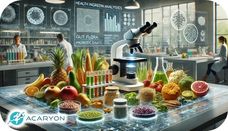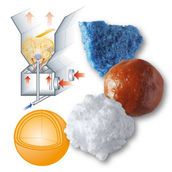Study nutritional sciences online: Now at Fresenius
Cooperation with ASU for the highest quality of education
Advertisement
The Nutrition Hub and the Federal Center for Nutrition recently published the fourth edition of the Nutrition Trend Report 2023. This report, which is based on surveys of 170 experts, clearly shows that awareness of healthy eating and interest in mindful eating are constantly growing. The diet of the future is set to become more climate-friendly and sustainable.
In times when diet-related illnesses are on the rise, knowledge about healthy eating is becoming increasingly important. Fresenius University of Applied Sciences (HSF) is responding to this growing interest and is now launching a new distance learning course in nutritional sciences (B.Sc.) in German. This program was developed in cooperation with the renowned Arizona State University (ASU) and starts on the first of each month.
Arizona State University is a top international university characterized by outstanding achievements. It has been ranked first in innovation in the USA for nine years in a row, ahead of renowned institutions such as MIT and Stanford (U.S. News & World Report, 2016-2024). ASU also ranks first for the best online bachelor's degree programs in business. These top rankings underscore ASU's high quality and potential, which makes the cooperation with Fresenius University of Applied Sciences particularly valuable.
The Nutritional Sciences (B.Sc.) degree program is designed to last six semesters in full-time study or eight semesters in part-time study and is offered in German. The main subjects include scientific basics, biological-medical basics, nutritional science, nutritional medicine/dietetics, food science, nutritional psychology/counselling as well as scientific work and professionalization, which includes, for example, project management or the practical project foundation.
The course also offers three specializations:
1. health promotion & prevention
2. social media & content creation
3. mental health
Graduates of this degree program have the opportunity to obtain certification as a nutritionist from the German Nutrition Society after graduation. The competencies required for certification are covered by the degree program.
The degree program prepares students comprehensively for a variety of professional fields. These include, among others:
1. nutritional counseling: creating individual nutritional plans and counseling in hospitals, clinics or private practices.
2. product development: working in the food industry to develop new products.
3. quality assurance: ensuring compliance with legal regulations and quality standards in food production.
4. public health: developing and implementing programs to promote healthy eating in public institutions.
Advantages of the distance learning program in Nutritional Sciences (B.Sc.) at Fresenius University of Applied Sciences:
1. growing importance of nutrition: relevance of knowledge about healthy nutrition in the face of increasing diet-related diseases.
2. versatile career opportunities: wide range of employment opportunities in various fields such as health consulting, food industry, research, sports nutrition and public health.
3. scientific interest: Combination of biology, chemistry and medicine with a focus on scientific principles of nutrition.
4. practical application: Opportunity to apply scientific knowledge directly to practice, with high flexibility of distance learning.
Distance learning also promotes important skills such as self-motivation and self-discipline, as students can organize their studies independently and manage their time flexibly. These skills are of great benefit not only during their studies, but also in their professional life. In addition, commuting times are eliminated, which saves both time and money.
With the new Nutritional Sciences (B.Sc.) degree program, Fresenius University of Applied Sciences, in cooperation with Arizona State University, offers a high-quality education that can be ideally combined with professional and personal commitments.
Note: This article has been translated using a computer system without human intervention. LUMITOS offers these automatic translations to present a wider range of current news. Since this article has been translated with automatic translation, it is possible that it contains errors in vocabulary, syntax or grammar. The original article in German can be found here.






























































